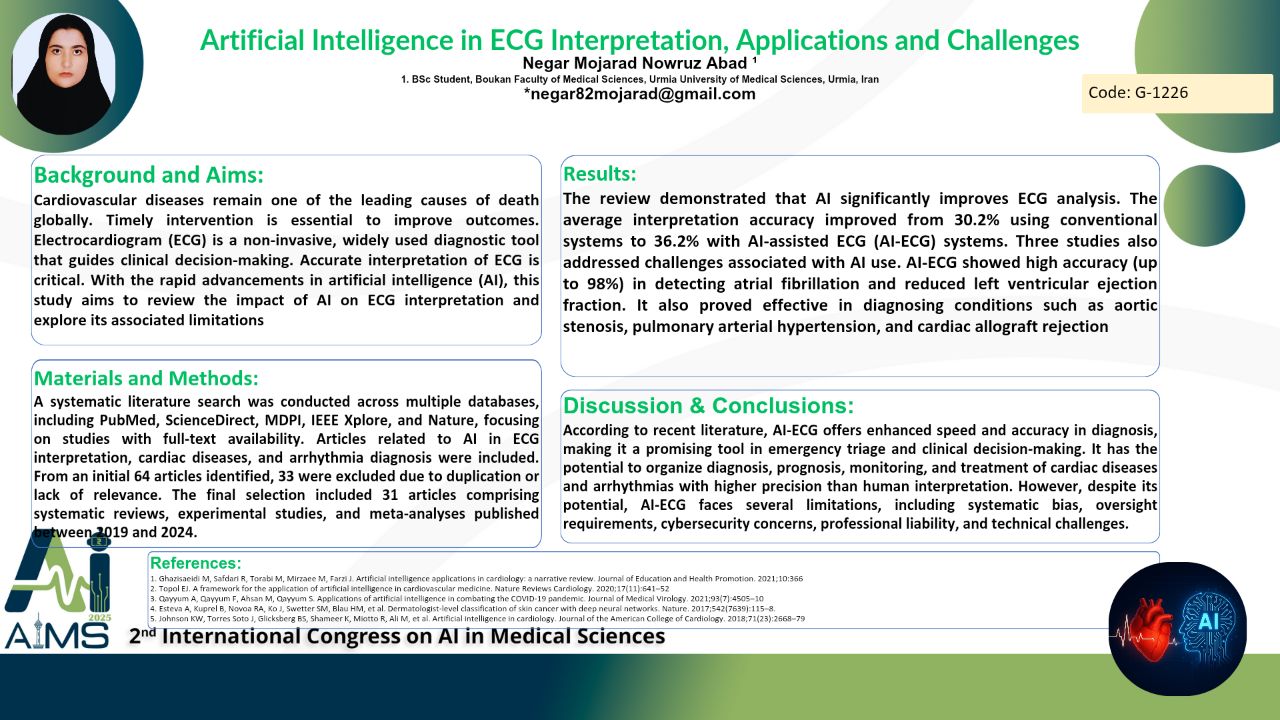هوش مصنوعی در تفسیر ECG ، کاربرد ها و چالش ها
کد: G-1226
نویسندگان: Negar Mojarad Nowruz Abad * ℗
زمان بندی: زمان بندی نشده!
برچسب: سیستم های تصمیم یار بالینی
دانلود: دانلود پوستر
خلاصه مقاله:
خلاصه مقاله
Background and Aims: Cardiovascular diseases remain one of the leading causes of death globally. Timely intervention is essential to improve outcomes. Electrocardiogram (ECG) is a non-invasive, widely used diagnostic tool that guides clinical decision-making. Accurate interpretation of ECG is critical. With the rapid advancements in artificial intelligence (AI), this study aims to review the impact of AI on ECG interpretation and explore its associated limitations. Method: A systematic literature search was conducted across multiple databases, including PubMed, ScienceDirect, MDPI, IEEE Xplore, and Nature, focusing on studies with full-text availability. Articles related to AI in ECG interpretation, cardiac diseases, and arrhythmia diagnosis were included. From an initial 64 articles identified, 33 were excluded due to duplication or lack of relevance. The final selection included 31 articles comprising systematic reviews, experimental studies, and meta-analyses published between 2019 and 2024. Results: The review demonstrated that AI significantly improves ECG analysis. The average interpretation accuracy improved from 30.2% using conventional systems to 36.2% with AI-assisted ECG (AI-ECG) systems. Three studies also addressed challenges associated with AI use. AI-ECG showed high accuracy (up to 98%) in detecting atrial fibrillation and reduced left ventricular ejection fraction. It also proved effective in diagnosing conditions such as aortic stenosis, pulmonary arterial hypertension, and cardiac allograft rejection. Conclusion: According to recent literature, AI-ECG offers enhanced speed and accuracy in diagnosis, making it a promising tool in emergency triage and clinical decision-making. It has the potential to organize diagnosis, prognosis, monitoring, and treatment of cardiac diseases and arrhythmias with higher precision than human interpretation. However, despite its potential, AI-ECG faces several limitations, including systematic bias, oversight requirements, cybersecurity concerns, professional liability, and technical challenges.
کلمات کلیدی
AI, ECG Interpretation, Cardiac Diseases, AI-ECG
